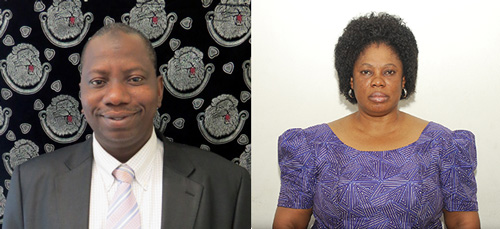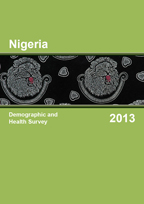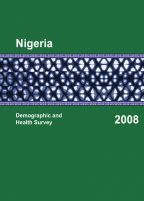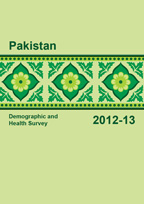Spotlight on Implementing Agencies: Nigeria
In March 2014, The DHS Program welcomed visitors from Nigeria. This is the third in a series of interviews with visitors to DHS headquarters.
Name(s):
Inuwa Bakari Jalingo (Project Coordinator, Nigeria DHS) and Ezenwa Nwamaka “Amaka” Loveth (Project Director, 2013 NDHS, Deputy Director, National Population Commission, Nigeria).
Country of origin:
Nigeria
When not working, favorite place to visit:
Inuwa: The farm
Amaka: The market
Where would we find you on a Saturday?
Inuwa: In Jalingo at the farm, in Abuja at home or at work.
Amaka: At home.
First time you worked with DHS data:
Inuwa: 1999
Amaka: 2003
What do you miss most about home when you are here?
Inuwa: I miss my family.
Amaka: I miss my family, the warm weather in my country, and sometimes my favorite dishes.
What is your favorite DHS final report cover?
Inuwa: The 2008 Nigeria DHS. I also like the Pakistan cover.
Amaka: I like the 2013 Nigeria DHS cover.
Favorite DHS chapter or indicator, and why?
Inuwa: Infant mortality –Children are not supposed to die, rather they should live to their full potentials. I want to see that indicator drop in my country to 1 digit.
Amaka: Child Health, because of my love for children.
What population or health issue are you most passionate about? Why?
Inuwa: Maternal/Child Care– I want to see women giving safe births and children survive the first 5 years after birth.
Amaka: Maternal health, because I have lost many relations and some friends due to complications during child birth.
How do you hope the DHS data from your country will be used?
Inuwa: To re-strategize programs and projects and formulate policies that will improve the quality of life and standard of living among Nigerians.
Amaka: to be used by the government to improve programming for a better life for its citizens.
What have you learned from the DHS experience?
Inuwa: I have learned professionalism and specialization, since staff specialized in specific areas and views are respected.
Amaka: it has built my capacity generally.





thank you for the great work.
I Cant access communities in lagos by rural and urban areas just have the numbers from the digest of statitics 2011.
I am embarking on a Comparative cross-sectional study of the Home management of diarrhoea in children under five in rural and urban areas, Lagos, Nigeria. In completion of Msc in public health at University of Lagos.
I need the communities by name to randomly select areas for purpose of study. thank you
Which state are you going to conduct your study?
Lagos was the state I conducted the studies
Hello Emmanuel,
Thank you for your comments. I encourage you to visit the User Forum (http://userforum.dhsprogram.com/) and post your question there, in the appropriate category. Someone there will be happy to help you out!
Thanks again.
I am extremely delighted at the early release of the 2013 Nigerian Demographic Health & Survey by the National Population Commission. I am an economist and researcher from Elizade University, Ilara-Mokin Ondo State. Like I did request from Mr. Sani Gar (the Project Director for the 2008 Nigerian DHS) a couple of years ago for more information on the 2008 Nigerian Demographic Health & Survey, I want more information and data on the 2013 Nigerian Demographic Health & Survey. First, I want the release of information which would allow me identify each of the specific LGA from which the data is collected. I want to match a large number of historical and contemporary data available on LGA basis with the 2013 Nigerian Demographic Health & Survey data. For instance, I want to match the number of mission schools established between 1843 and 1925 at each LGA with the 2013 Nigerian Demographic Health & Survey at the LGA level. I have a number of other data to be matched in the same way. I cannot do that because the 2013 survey, like the 2008 version, has only codes for LGAs, without mentioning the names of the LGAs to which the codes refer. Secondly, unlike the 2008 version, downloaded from measured DHS website, the 2013 version available on NPC webpage has no household members data, which the data set with the highest number of observations (178,894). I would want these data as well. Finally, I want information on the coordinates of the cluster areas from which the 2013 data is collected. Congratulations on the successful completion of this great national assignment. Thanks.
Dear Musiliu Adewole,
Thank you for your comment! Please post these questions in the DHS User Forum. There, DHS staff or others will be able to help you find what you need!
Please what are the requirements and the procedure to get an NPC attestation. This has to do with one seeking resident permit abroad.
How long does it take and what is the cost?
Can it be done for someone abroad?
Thanks
Dear Ngozi Onyekachi,
Thank you for your comment! Please refer directly to the NPC with your question. The DHS Program is not involved in this process.
A very good job, I congratulate u Inuwa Bakari Jalingo for a job weldone, I participated in DHS2008 as a quality control officer. I Hope all d data collected will useful in my country
I congratulate Inuwa Bakari Jalingo for job weldone,we hope and pray d data should be implimented one day
Hello,it’s good to be here.I wish to get the details of each community to enable me have a quality study on the randomly selected areas.Thanks
Hello Chiamaka,
The geographic datasets are available for Nigeria (http://dhsprogram.com/data/dataset/Nigeria_Standard-DHS_2013.cfm?flag=0). You will need to log in as a registered DHS data user, or register if you have not already done so.
If you have any additional questions, please post on our user forum (http://userforum.dhsprogram.com/) in the appropriate category, where a moderator will be happy to assist you.
Thank you for visiting the blog!
Please, get me registered as a registered DHS data user. I am a lecturer of Demography and Social Statistics in the Department of Sociology, Olabisi Onabanjo University,PMB 2002, Ago-Iwoye, Ogun State, Npgeria
Thank you for your interest in accessing datasets! We encourage you to watch the following videos to learn how to register and download specific datasets: http://bit.ly/1Tt4aeO
Please why were the questions related to tuberculosis and obstetric fistula dropped from the 2013 Nigeria survey?
Thanks
Thanks for the reply. I am done with my MSc in Public health program and seeking internship as an early career epidemiologiat. kindly assist.
Pls how can I CONTACT MS. AMAKA LOVETH? I AM A MEDICAL STUDENT WORKING ON MY PROJECT AND I NEED DATA FROM NDHS.
THANK YOU
Hello, the 2018 Nigeria DHS is currently still ongoing, but the most recent report we have is for the 2015 Nigeria MIS and the datasets are available for that survey (https://dhsprogram.com/what-we-do/survey/survey-display-474.cfm).